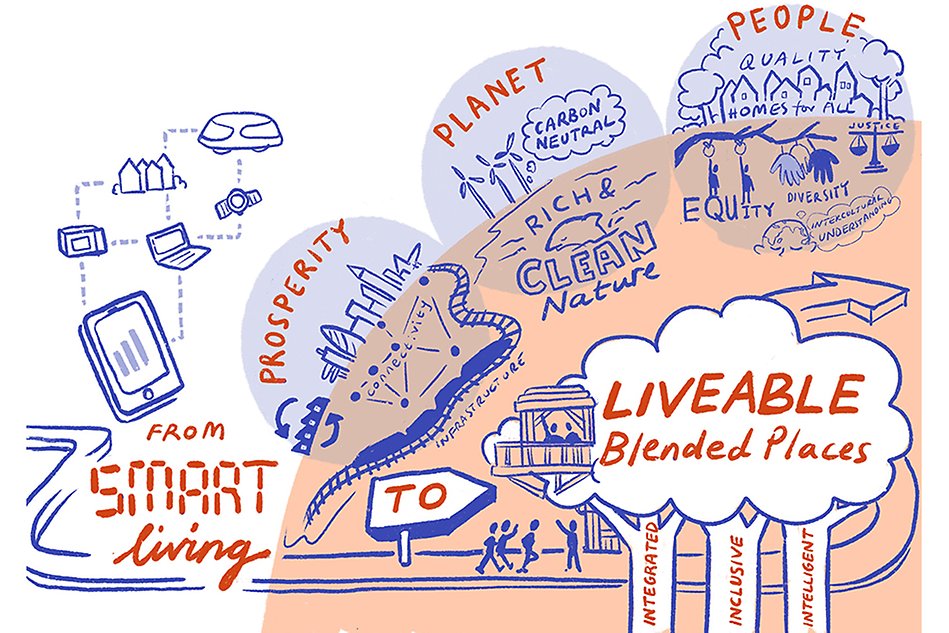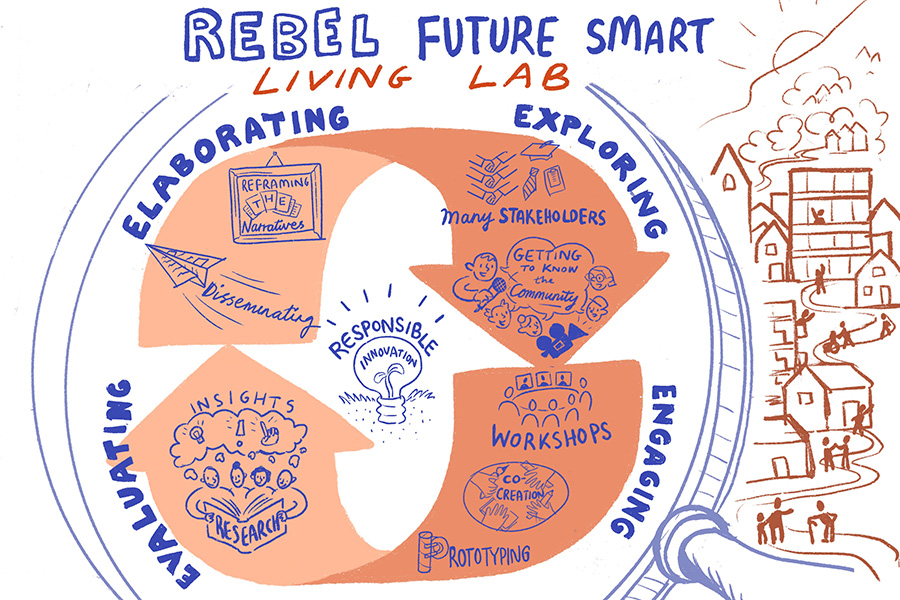REBEL: Re-Imagining Future Smart Living – Beyond the Living Lab
The research programme REBEL (Re-Imagining Future Smart Living – beyond the Living Lab) is about how socially and environmentally sustainable smart cities and communities can be promoted in a participatory and responsible way that takes social and local values and know-how into account.

REBEL is the design hub at Halmstad University
We explore and design for future liveable blended places. Under the umbrella of REBEL we gather Halmstad University's expertise in design – ranging from the design of services, experiences and AI-powered robots to speculative and norm-critical design, from product design to smart objects and materials. Design is for us not only an outcome, but also a way of thinking and making that shapes the REBEL approach to education and research.
The vision of the programme is a world where the development of smart technology takes place in a responsible, ethical, and socially relevant way. Through locally based Living Labs, the idea is that REBEL will promote co-created design concepts for the sustainable living of the future.
REBEL engages several of Halmstad University’s well-established research groups, including design ethnography, service design, green transition, AI and smart materials, norm-critical design, sociology, humanities, and innovation (see list of engaged researchers below).

REBEL is actively involved and holds a leading position in 19 Living Labs across Europe.
REBEL’s mission
The REBEL mission is to:
- Lead internationally on co-creative design ethnographic future living labs with impact for socially sustainable everyday life.
- Democratise technological development in future living thorugh human-centred design and responsible innovation.
- Support and assess green transition by aligning decarbonisation and digital transformations with social sustainability through making and implementing concepts for future livable places and quality of life within planetary boundaries.
- Build bridges that foster transdisciplinary and cross-sectoral professional collaborations and connects research and HEI education through a developed REBEL pedagogy.
- Provide a networking platform for mutual support, facilitate project opportunities, academic careers and guidance to the wider community.
REBEL does this by creating a support system of REBEL meet-ups, networking opportunities, seed-corn projects and strategic REBEL pedagogy development. REBEL is led by a leader’s pool of international guest professors, Halmstad University researchers and REBEL project leaders.
Participating researchers
School of Information Technology
- Charlotte Arghavan Shahlaei, Associate Senior Lecturer External link.
- Imad Bani Hani, Associate Senior Lecturer External link.
- Magnus Bergquist, Professor External link.
- Meike Brodersen, Associate Senior Lecturer External link.
- Robert Broström, Adjunct Professor External link.
- Stefan Byttner, Professor External link.
- Emma Börjesson, Lecturer External link.
- Katerina Cerna, Associate Senior Lecturer External link.
- Martin Cooney, Senior Lecturer External link.
- Mark Dougherty, Professor External link.
- Vaike Fors, Professor External link.
- Ahmad Ghazawneh, Senior Lecturer External link.
- Dimitrios Gkouskos, Senior Lecturer External link.
- Lena Hylving, Senior Lecturer External link.
- Lars-Olof Johansson, Senior Lecturer External link.
- Magnus Jonsson, Professor External link.
- Susanne Lindberg, Senior Lecturer External link.
- Mats Lindqvist, Lecturer External link.
- Jesper Lund, Senior Lecturer External link.
- Roy Yi Luo, PhD Student External link.
- Sus Lyckvi, Senior Lecturer
- Simon Norris, PhD Student
- Nicole Norris, PhD Student
- Sarah Pink, Monash University, Guest Professor
- Andrea Resmini, Senior Lecturer External link.
- Rachel Smith, Aarhus University, Guest Professor
- Oliver Weberg, PhD Student External link.
- Pontus Wärnestål, Associate Professor External link.
School of Business, Innovation and Sustainability
- Martin Bergman, Lecturer External link.
- Maya Hoveskog, Senior Lecturer External link.
- Anders Hylmö, Associate Senior Lecturer External link.
- Jeaneth Johansson, Professor External link.
- Thomas Magnusson, Professor External link.
- Heidi Norrström, Senior Lecturer External link.
- Eugenia Perez Vico, Senior Lecturer External link.
- Hanna Rydehell, Associate Senior Lecturer
- Bengt-Göran Rosén, Professor External link.
- Joakim Tell, Senior Lecturer External link.
School of Health and Welfare
- Anna Condelius, Senior Lecturer External link.
- Anna Isaksson, Senior Lecturer External link.
- Pernilla Ouis, Professor External link.
- Britta Teleman, PhD Student
School of Education, Humanities and Social Sciences
News within REBEL
Pre-studies to develop applications
REBEL funds researchers at Halmstad University who want to conduct preliminary studies to create conditions for new exciting projects and collaborations to emerge with so-called seed-corn projects.
The focus is on exploring and co-creating cultural, social and physical values in future smart living. Currently, the research programme has nine seed projects underway to develop applications:
- Norm-critical design of SIS housing (Anna Isaksson & Emma Börjesson)
- Student housing of the future (Andreas Resmini)
- How digital technology can bring nature closer in urban areas (Katerina Cerna)
- Energy consumption and the future of smart homes (Jonnie Eriksson & Tomas Nilson)
- FabLab development (BG Rosén)
- Future Data Ethics (Charlotte Arghavan)
- Democratisation and accessibility of prosthetics (Fawzi Halila)
- Co-design of future work vehicles (Dimitrios Gkouskos)
- Co-design of socially sustainable mobility hubs (Jesper Lund)
More information
Contact
-
Professor and Research Programme Leader
-
Professor and Deputy Research Programme Leader

